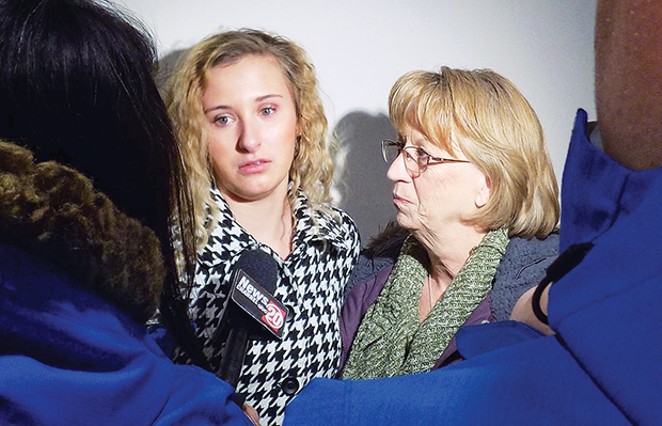
An accused fugitive from justice. A widow who wouldn’t cooperate with police who investigated the killing of her husband. She recently broke off an engagement to a married man who has pleaded guilty in connection with a $175 million fraud scheme.
She has also raised a daughter who is remarkably intelligent and appears the essence of resiliency.
Sidney Watkins, 9, has an IQ of 122. She earns A’s and B’s and wins high marks for behaving well in school. She’s learned to change the diaper of a one-year-old niece. Her smile is unsurpassed.
“She’s a charming little girl, and I was moved when I met her,” said Cass County Circuit Court Judge Robert Hardwick, Jr. during a hearing last week that will help define Sidney’s future. “I’d like to take her home myself. She’s turned out pretty well, despite what the adults have done.”
Tasked with deciding who should raise Sidney as she heads toward adolescence, Hardwick signaled that he will return the girl to her mother after another hearing set for Jan. 20. It is not a typical custody case.
Steven Watkins, Sidney’s father, was gunned down in 2008 when he went to his estranged wife’s house in Ashland to pick up his daughter for a court-ordered visit. Shirley Skinner, Jennifer Watkins’ grandmother, is serving 55 years for first-degree murder, but not everyone is confident that she pulled the trigger. A small-town cop who’d never before handled a homicide put himself in charge of the investigation. By the time Illinois State Police took over, there was virtually no evidence save for Skinner’s statement at the scene: I did it.
Jennifer Watkins refused to cooperate with police. Folks on Facebook and commenters on online news stories accuse her of murder and contend that Skinner took the fall for her granddaughter. Six years after winning a murder conviction against Skinner, Ed Parkinson, a state appellate prosecutor who is helping with the custody case, still has questions about the killing.
“You were right there – why did she (Skinner) shoot him?” Parkinson asked during last week’s hearing.
“I was in another room,” Watkins responded. The statement stood in contrast to her explanation on a GoFundMe.com page, set up to solicit money for legal expenses, in which Jennifer Watkins says that her estranged husband was threatening her and Sidney and so her grandmother fired a warning shot that accidentally struck Steven Watkins in the back of his head.
After Skinner’s conviction, Steven Watkins’ grandparents won visitation with Sidney. In awarding visits, Judge Hardwick in 2010 found that Sidney would suffer psychological harm if she couldn’t visit her paternal grandparents, whom he deemed were best equipped to tell the girl about her deceased father. Shortly afterward, Jennifer Watkins and her daughter moved to Florida, cutting off visits. An arrest warrant for contempt of court went unserved until September, when police in Massachusetts picked her up a few months after she moved to the Bay State to be with a married man whom she says she intended to wed. Sidney has been in the temporary custody of a paternal aunt ever since.
Last week, Jennifer Watkins teared up as she testified that she moved from Illinois after screaming strangers accosted her in malls and other public places. Burning objects, she said, were tossed in the yard of her family’s home in Ashland. It was no longer prudent, she asserted, to live in central Illinois.
“My safety and my daughter’s safety were highly compromised,” she testified.
Watkins also testified that she had been in touch with Penny Watkins, Sidney’s paternal grandmother, to arrange visits, a notion that Penny Watkins dismissed when she took the stand. According to Penny Watkins, the only invitation to visit Sidney that Jennifer Watkins sent came via text message on a day that she didn’t produce Sidney for a court-ordered visit in 2011: “Gone out of state. You can come visit if you want to.”
Penny Watkins testified that she was allowed to speak with Sidney by telephone twice on birthdays. The conversations, she testified, each lasted five minutes and were conducted by speaker phone. Sidney’s relatives on the other end, she said, told her that they were listening to ensure that nothing inappropriate was said. After the second call, she said, the telephone number she had to reach Sidney no longer worked.
Jennifer Watkins testified that she had “multiple conversations” about visitation with Hardwick after she’d left Illinois. From the bench, Hardwick didn’t deny speaking with Watkins by telephone, but said that there was no relevant talk about the case.
“Nothing of substance was ever discussed with Miss Watkins over the phone to my recollection,” Hardwick said. The judge also rejected Jennifer Watkins’ claim that she’d made overtures to Penny Watkins to establish visits.
“I would be the most naïve person on the planet to believe you did that,” the judge told her near the end of the three-hour hearing during which Jennifer Watkins admitted that she had erred in blocking visitation between her daughter and the girl’s paternal grandparents.
There was considerable testimony regarding Frederick Thomas Giampa, Jennifer Watkins’ erstwhile fiancée who recently pleaded guilty in a $175 million fraud scheme (“The faces of Jennifer Watkins,” Dec. 8, 2016), with Parkinson and Rick Cruz, Sidney’s guardian ad litem, suggesting that getting engaged to a felon might have exhibited poor judgment, particularly since Giampa is married. Jennifer Watkins testified that she met him in church about three years ago and that he’s in the final stages of a divorce. She said that she moved to Massachusetts last summer, where Giampa owns a home, and was living in an apartment at his parents’ residence.
“I broke up with Mr. Giampa because of personal reasons,” Watkins answered when Parkinson asked if she’d ended the relationship because he’d been indicted. She added that she couldn’t remember when Giampa told her that he was under criminal investigation, but she ended the relationship after returning to Illinois last fall.
The hearing was called to determine whether Jennifer Watkins had neglected her daughter, a question that hinged on whether the denial of grandparent visitation constituted neglect. There is no precise definition of “neglect” under the law, and Hardwick ruled that Jennifer Watkins had neglected her daughter. The next step is determining whether she should be stripped of parental rights. Such a ruling would allow the girl’s paternal relatives to adopt Sidney.
But Hardwick told Jennifer Watkins that he’s inclined to give her daughter back. He urged her to get counseling and told the lawyers to figure out a way that Sidney could be reunited with her mother while ensuring that she would not again flee the state.
“The child is coming your direction – you’re in the driver’s seat when it comes to determining when that’s going to happen,” Hardwick said. “You’ve got control issues, and everyone in here knows that. That’s why Steven was killed. … Sidney has done pretty well. She’s in good shape. But could she be in better shape? Absolutely.”
Hardwick’s decision came after Ashley Clements, Sidney’s aunt who has been caring for the girl, testified that Sidney was in tears when she returned from a supervised visit with her mother shortly before Thanksgiving.
“She said that sometimes she misses her mom,” Clements testified. “I gave her a hug and she got up and started playing with the kids. I told her it was OK to feel that way.”
Judy Osgood, a psychologist hired by Jennifer Watkins, testified that Sidney repeatedly told her that she wants to return to her mother. Osgood also found no sign of neglect.
“She’s healthy, she’s comfortable, she’s secure,” Osgood said. “Based on all those factors, it’s obvious she has not been neglected. It’s my opinion that she’s not only not been neglected, she’s been very well taken care of.”
Sidney, Osgood testified, is “a sweet, sensitive girl” who knows that she’s at the center of a big fight.
“At nine years old, she’s very aware that she’s in the middle, that she’s embedded in the middle of this huge conflict,” Osgood said.
Osgood said that Jennifer Watkins told her that she’d wear an electronic ankle bracelet to keep her from leaving the state if that’s what’s required to get her daughter back.
“I think she’s aware that her relationship with Sidney is at stake,” Osgood testified.
Watkins still faces jail for contempt of court charges filed after she refused to follow visitation orders. Hardwick last week set a May 8 trial date.
Parkinson said afterward that he wasn’t surprised by Hardwick’s ruling. Michael Goldberg, Jennifer Watkins’ attorney, called the decision fair.
“We’re hopeful,” Goldberg said. “I know that Jennifer is open to the idea of an ankle bracelet – she’s open to any idea that will return Sidney to her.”
Alexendrea Watkins, Sidney’s half-sister who is now in high school, teared up after the hearing, saying that she’ll miss Sidney, who has told her that she wishes that she could have known her father. Penny Watkins, the grandmother of both girls, said that she feels for her son’s eldest daughter.
“My heart broke for Alex – she’s so young,” Penny Watkins said. “But, on the other hand, I understand the judge because I’m a mother.”
Contact Bruce Rushton at [email protected].




















